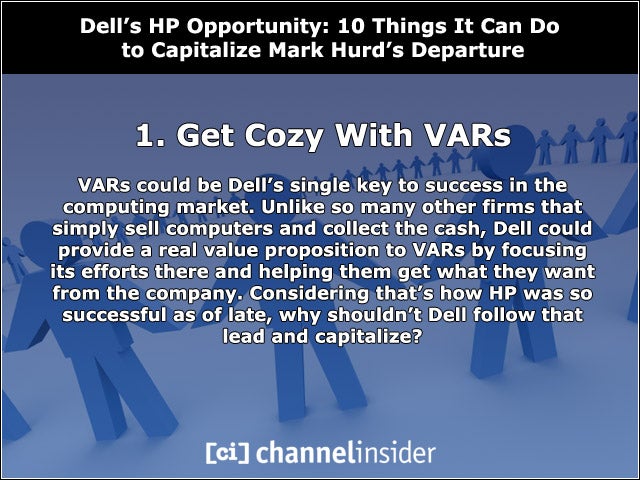 1. Get Cozy With VARs
1. Get Cozy With VARs
VARs could be Dell’s single key to success in the computing market. Unlike so many other firms that simply sell computers and collect the cash, Dell could provide a real value proposition to VARs by focusing its efforts there and helping them get what they want from the company. Considering that’s how HP was so successful as of late, why shouldn’t Dell follow that lead and capitalize?
 2. Work On Tablets
2. Work On Tablets
Tablets are quickly becoming the key battleground for PC makers. And with Hurd leaving, it’s entirely possible that HP won’t spend nearly as much time on tablets as it should. If that’s the case, Dell needs to capitalize as quickly as possible. Its Dell Streak is a good first step, but it needs to go beyond that. Tablets are the mobile market’s future. If Dell doesn’t carve out a significant portion of it for itself now, it’s leaving HP’s next CEO an opening.
 3. Get Close With Google
3. Get Close With Google
One of the few mistakes Mark Hurd made while he was at HP was to not have an effective relationship with Google. In fact, he turned his back on the company in the mobile enterprise twice, by first announcing a Windows-based HP Slate, and then acquiring Palm. Whether or not the next HP CEO will rebuild the company’s relationship with Google is unknown, but it would be a good idea for Dell to do so now.
 4. Focus On Consumers
4. Focus On Consumers
Consumers have been a key battleground for Dell. And yet, the company has been losing that space to HP. Part of the reason is HP’s realization that good-looking computers will increase market share. Dell should look towards its Alienware division and start delivering more consumer-friendly computers. With no one at the top of HP, now is the moment.
 5. Forget About Being Dell
5. Forget About Being Dell
Part of the reason for HP’s success over the past five years is that it stopped trying to be Dell, and started being its own company with unique perspectives on what’s good and bad in both the corporate and consumer environments. Now that HP lacks a CEO, maybe it’s time for Dell to change tactics. It has the time now, thanks to the uncertainty at HP, to stop being Dell and reinvent itself. This is an opening that won’t come all that often. It must capitalize.
 6. Keep the Enterprise In Mind
6. Keep the Enterprise In Mind
The corporate world has historically been the place where Dell has defined itself. Going forward, the company should keep the enterprise in mind and realize that without a CEO at HP, now is the best time to infiltrate that space even more effectively. It won’t be easy—Mark Hurd’s influence is still felt in the enterprise—but it’s at least worth trying.
 7. Marketing Is Key
7. Marketing Is Key
Now is the time for Dell to start marketing its products more than ever before. HP is focusing all of its time on finding a new leader. Because of that, it doesn’t have the energy or the attention span to worry about Dell taking it on in the advertising market. If Dell can get its marketing machine going and show stability, it could help the company immensely.
 8. Smartphones?
8. Smartphones?
With HP’s acquisition of Palm, it’s clear that the company wants to break into the smartphone market. Now that Hurd is gone, the visionary behind the deal, maybe it’s time for Dell to start bringing smartphones of its own to the market. Ideally, they would run on Android OS and be offered on several different networks. Smartphones could be central to Dell’s success going forward.
 9. Capture the Quality Talent
9. Capture the Quality Talent
Part of the value of a key competitor’s CEO leaving the company is that the top talent that the person relied upon could be unhappy under the new regime. If that happens, Dell should start grabbing the highest-quality employees that it can find. Whether it’s the company’s enterprise division or its consumer division, Dell should do whatever it can to bolster its ranks and hurt HP’s in the process.
 10. Get Close to Microsoft
10. Get Close to Microsoft
Although Microsoft has lost its way in recent years, it is still one of the most dominant companies in the tech industry. It also had a relatively strong relationship with HP. If Dell wants to capitalize on Hurd’s departure, it should do everything it can to build an even stronger relationship with the software giant. When the next CEO takes over and finds that Dell is close with Microsoft, it will make it even harder for that leader to help HP. That should be Dell’s goal.

